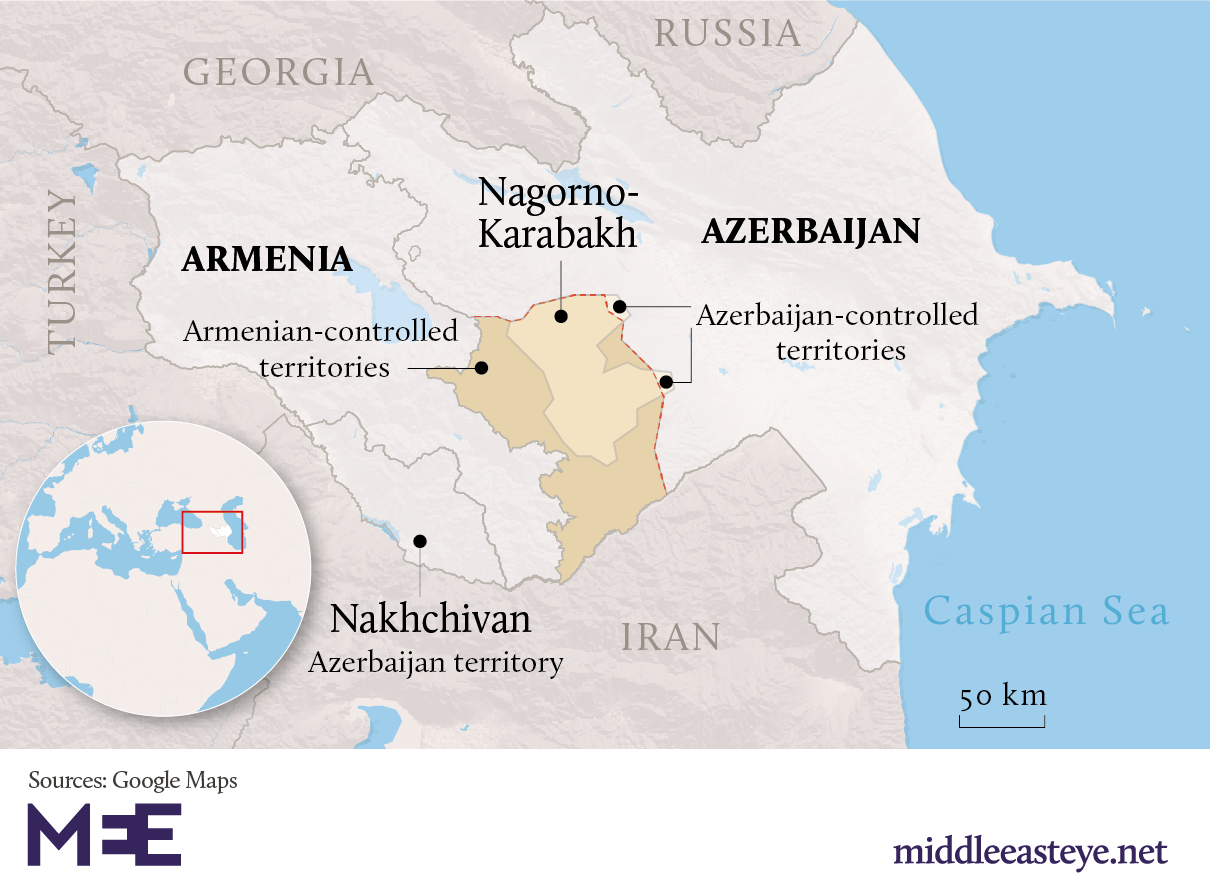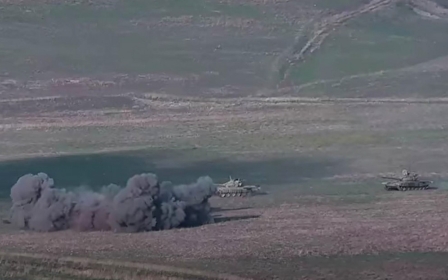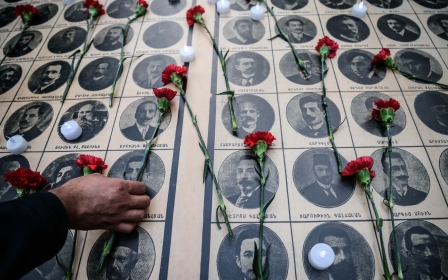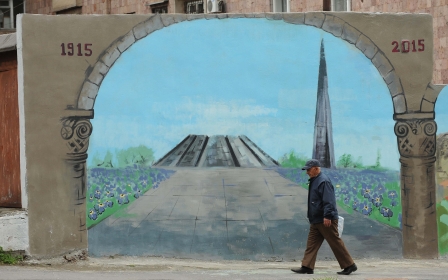Explained: Armenia and Azerbaijan's Nagorno-Karabakh conflict
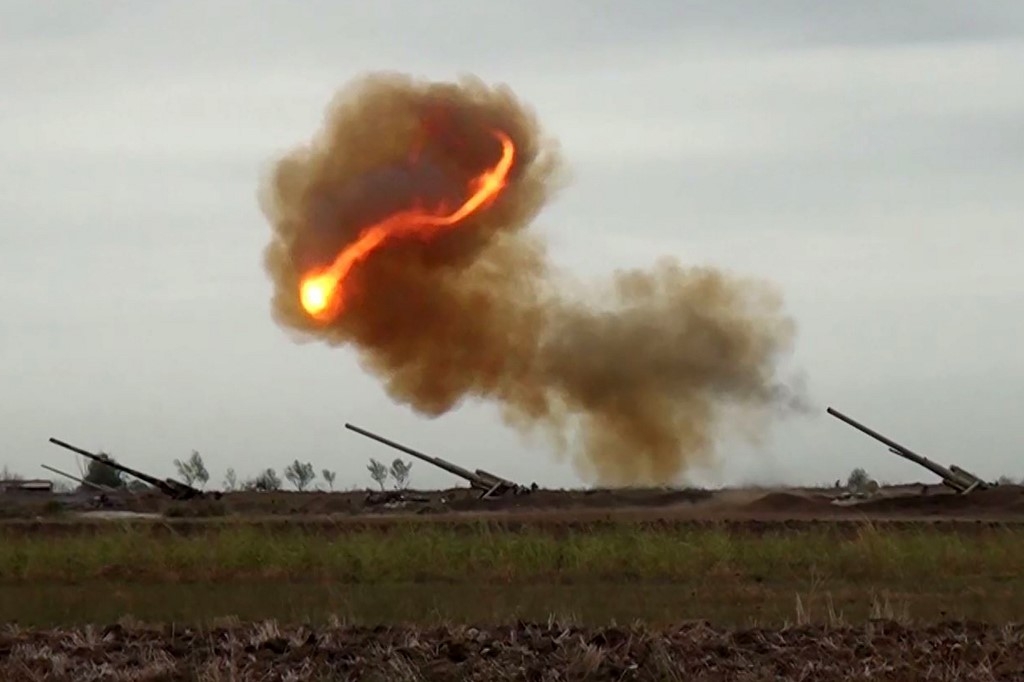
Armenia and Azerbaijan have been engaged in a deadly armed confrontation since Sunday over the disputed region of Nagorno-Karabakh, prompting fears of an all-out war in a strategic international oil and gas corridor.
Nagorno-Karabakh is at the centre of an ethnic and territorial conflict between the two countries that dates back to the early 20th century.
A breakaway Armenian-majority region inside Azerbaijan, Nagorno-Karabakh has around 150,000 inhabitants.
Armenia is majority Christian, while Azerbaijan is majority Muslim.
New MEE newsletter: Jerusalem Dispatch
Sign up to get the latest insights and analysis on Israel-Palestine, alongside Turkey Unpacked and other MEE newsletters
Though it is part of Azerbaijan, Nagorno-Karabakh is run by separatist Armenians supported by the Armenian government. They have sought for decades to split from Azerbaijan and become part of Armenia, though unsuccessfully.
In the 1990s, the region broke away from Azerbaijan, but has yet to be recognised by any country in the world.
Key dates in the conflict:
1920s: During Soviet rule in the south Caucasus, Nagorno-Karabakh became a semi-independent Soviet region within Azerbaijan.
1988: Nagorno-Karabakh voted to be part of Armenia, a decision opposed by both Baku and Moscow.
1990s: With the collapse of the Soviet Union, Soviet rule was transferred to Baku, but the majority Armenian population in the region resisted that decision.
1991: Armenian separatists seize Nagorno-Karabakh, along with seven adjacent Azeri districts, triggering a conflict that led to the death of at least 30,000 people and the displacement of hundreds of thousands.
1992: The Conference on Security and Cooperation in Europe (now the Organisation for Security and Co-operation in Europe (OSCE) created the Minsk Group to encourage a peaceful, negotiated resolution to the Nagorno-Karabakh conflict. Co-chaired by Russia, France and the United States, the Minsk Group was criticised by Azerbaijan as biased to Armenia.
1994: A ceasefire was signed, ushering in two decades of relative stability.
2016: Deadly fighting erupted, killing at least 200 people from both sides.
2018-2019: When the freely elected protest leader Nikol Pashinyan came to power in 2018, he took steps with Azerbaijan's President Ilham Aliyev to bring about a peaceful resolution to the conflict, vowing in a joint-statement in 2019 to “take concrete measures to prepare the populations for peace".
July 2020: A flare-up of fighting between the two countries kills at least 17 combatants from both sides.
27 September 2020: Clashes erupted between Armenian and Azeri forces in Nagorno-Karabakh. Armenia declared martial law and mobilised its male population to join the fighting.
Geopolitics:
Russia
Russia has good relations with both Armenia and Azerbaijan, but it also has a defence alliance with Armenia, as both are members of the Collective Security Treaty Organisation (CSTO) and Russia has a military base in Armenia.
Moscow has acted as the main mediator between the two countries for years, with its attempts so far largely unsuccessful.
'All eyes are now on Moscow to see if it can again stop the fighting in the conflict zone'
- Olesya Vartanyan, International Crisis Group
After the deadly conflict in 2016, then Russian Prime Minister Dmitry Medvedev visited both Yerevan and Baku to broker peace, while his foreign minister, Sergei Lavrov, engaged in shuttle diplomacy between the two capitals.
In the weeks leading to the current escalation, however, Russia “did not pay the region the attention it received before,” Olesya Vartanyan, senior analyst for the South Caucasus region at the International Crisis Group, told Middle East Eye.
“It was precisely the lack of reaction to the July escalation that opened the way for large-scale hostilities,” she said.
“We have not seen attempts to bring the leaders to the negotiating table and have not seen visits by high-ranking officials. All eyes are now on Moscow to see if it can again stop the fighting in the conflict zone.”
Armenian Prime Minister Nikol Pashinyan reportedly said on Tuesday that he was not considering asking for Moscow’s support, but also did not rule it out.
"Armenia will ensure its security, with the participation of the Collective Security Treaty Organisation (CSTO) or without it," he was quoted by Russian news agencies as saying.
Iran
Shia-Muslim majority Iran shares its northern borders with Azerbaijan and Armenia.
While Azerbaijan has the same religious majority as Iran, the latter is reportedly backing Armenia due to trade ties with Yerevan as well as Tehran’s political alliance with Russia.
“Iran has always played a balancing role without taking a position on any of the sides,” said Vartanyan, the Crisis Group analyst.
“Tehran is currently concerned with the ongoing fighting, which takes place right next to its border with some reports of grenades and other projectiles reaching its territory,” she told MEE.
Vartanyan explained that during the war in Nagorno-Karabakh in the early 1990s, Iran attempted but failed to bring about a ceasefire between the two sides.
Following Sunday’s clashes, Iran encouraged a halt to hostilities.
"Iran is closely monitoring the conflict with concern and calls for an immediate end to the conflict and the start of talks between the two countries," foreign ministry spokesman Saeed Khatibzadeh said.
On 30 September, the Armenian prime minister discussed the conflict with Iranian President Hassan Rouhani in a phone call, according to Armenia's government press office.
"Iran's president expressed concerns on the tension between its two bordering countries and continuing military actions," the press statement said.
The two leaders also discussed Turkey's participation in the conflict, something Ankara's ally Azerbaijan has denied.
Turkey
Turkey supports Azerbaijan, not least because of cultural and linguistic ties between the two countries. Ankara was the first to recognise Azerbaijan after its independence from the Soviet Union in 1991.
On the other hand, Turkey has strained relations with Armenia, rooted in Armenian genocide accusations against the Ottoman empire. The two countries have no official diplomatic relations.
During the war between Armenia and Azerbaijan over Nagorno-Karabakh in 1993, Turkey closed its borders with Armenia in support for Baku.
Turkish President Recep Tayyib Erdogan and senior officials in his government have expressed their country’s support for Baku following the recent escalation.
On Tuesday, MEE reported that hundreds of Syrian rebels and civilians are being sent by Turkey to Azerbaijan to guard Turkish troops and strategic assets there, with suspicions that they may soon find themselves in the frontline of the fighting.
However, Ankara has so far denied providing military support for Baku, and Yerevan has also denied using Syrian mercenaries.
It remains unclear whether Turkey will directly intervene in the fighting.
Other countries
Israel has been a longtime ally of Azerbaijan.
The Stockholm International Peace Research Institute (SIPRI) - a leading conflict and armaments think-tank - has reported that Israel provided Azerbaijan with around $825m in weapons between 2006 and 2019.
On 30, September Azeri presidential aide Hikmat Hajiyev told Israel media that Azerbaijan was using "some" Israeli-made drones in fighting around Nagorno-Karabakh.
Israel's intervention has provoked anger in Armenia, who recalled their ambassador over the country's continuing arms sales to Azerbaijan.
Although France, along with Russia, officially supports a negotiated ceasefire, the country has accused Turkey of making "reckless and dangerous" statements in favour of Azerbaijan and of deploying Syrian fighters to Nagorno-Karabakh.
France's population includes about 600,000 people of Armenian origin, many of whom have been vocally supportive of Armenia in the conflict.
Partly reflecting the country's staunch opposition to Russia, the government of Ukraine has also announced its support for the "territorial integrity" of Azerbaijan.
A number of celebrities in the United States of Armenian origin have voiced support for Armenia in the conflict, including Kim Kardashian who called for the US to cut military aid to Azerbaijan and for "Baku to cease all offensive uses of force".
Metal band System of a Down said the Armenians of Nagorno-Karabakh were under "existential threat" and that the world needed to "call out Azerbaijan on its war mongering, ethnic cleansing, and killing of innocent civilians".
This article is available in French on Middle East Eye French edition.
Middle East Eye delivers independent and unrivalled coverage and analysis of the Middle East, North Africa and beyond. To learn more about republishing this content and the associated fees, please fill out this form. More about MEE can be found here.


